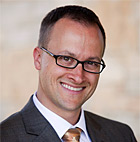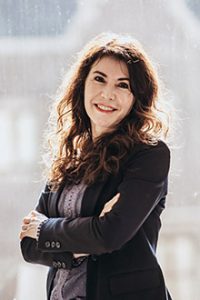Alumni Profile:
I’m better at evolving with the biotech industry.
Kim Hartz, who had made a successful career of clinical research, lived and worked in the Twin Cities—an area filled with venture capital connections. It was a region ripe with biotechnology product development opportunities—”interesting projects that I wanted to be a part of,” she notes. Her end goal was to become an independent consultant in biotechnology, but the problem was, as she explains, “I couldn’t fully evaluate the technology. I understood it from a clinical perspective but didn’t know where to go from there—how to appreciate the prospect’s true value, what intellectual property strategies to adopt, nor how to promote it.”
She began researching graduate programs and discovered the Master of Science in Biotechnology at UW-Madison. She conducted an informal interview, toured the program facilities and never looked back.
“I was returning to school at 40 and I didn’t just want a set of credentials. I wanted a program with meaning and value. This program was perfect—there’s nothing else like it. The degree has value because it is so unique—a blend of science, business and ethics related to biotechnology—and because the degree is from UW-Madison, one of the best kept secrets in terms of the biotechnology knowledge base and the technology that comes out of the university.”
Converting a weakness into a strength.
Upon entering the M.S. in Biotechnology program, Hartz had to master her acknowledged professional “weakness”—intellectual property (IP)—in order to prepare herself for a career transition. “IP scared me the most. I hadn’t written a paper in years and the first paper I had to write was on intellectual property.” As Hartz acknowledges, thanks to the high caliber, applied learning and instruction she did just fine on that first paper—and throughout the program.
In fact, as a successful independent consultant now running her own business in the Twin Cities, her IP knowledge base is a decided differentiator and professional strength for her. Today she uses what she learned in the program to evaluate diverse biotechnology projects from a “patent standpoint. I can confidently use the patent web site, understand what is being developed, what opportunities exist and the relevant timelines.” She continues, “Intellectual property changes your whole strategy—that you only have so much time to develop a project before someone else can come to market and compete with you. Now I understand those timelines.”
That understanding, she explains, “Has changed how I will move forward in my career. I have a much broader understanding of biotechnology product development—how it all comes together, I can respect the timelines, and I understand the patent process and why it happens the way it does. “That,” she notes, “has given me the skills to find the right project, the right people and the right product.”
A surprising strength—the student cohort.
Balancing a career, family life and an intensive two years of graduate-level weekend courses and presentations can be a bit daunting. That’s why Hartz is quick to point out that one of the program’s greatest strengths is the support provided by the cohort of students.
“My cohort was composed of marketers, bench scientists and regulatory people. I was the only clinical person,” she notes, “and I loved the different perspectives of my fellow students. Diversity added to the value of the education.”
While Hartz knew she was weak in some subjects and notes that her lab skills were a bit “rusty,” the combination of applied and shared learning allowed her to fill in her educational gaps and showcase her professional strengths. “The attorneys would share intellectual property knowledge and I’d share clinical knowledge. To share knowledge is incredible because while we all thought we understood the big picture, we really needed to learn something about each of the components to get the big product development picture.”
There were more personal benefits derived from the cohort as well. As Hartz notes, “the students became very tight. Nobody had an ego. If someone was scared—about a lab project or a presentation—they knew they were in a group that wouldn’t ridicule them. So everybody had the opportunity to be a star in the program.”
Because of that supportive environment, Hartz witnessed some incredible personal and professional transformations:
“To see the growth of people was amazing—to see them gain confidence and to become remarkable speakers.”
Better at evolving.
What is the future of biotechnology? According to Hartz, it’s so changeable that it’s hard to predict. And that means even greater opportunities. “IP changes all the time. Medical device regulation is being overhauled, even lab equipment is ever-changing.” Because of this constant evolution she notes, “I don’t think it’s possible to have a program totally prepare you—and that’s not a bad thing. Because it’s about becoming better at evolving, and I am better at evolving because of this program.” She concludes, “Thanks to this program I understand how much innovation is really going on and where that innovation can lead. The value is understanding how quickly things evolve and the value of a continuing education that helps you evolve along with it.”
This is an accordion element with a series of buttons that open and close related content panels.
Questions about the M.S. in Biotechnology Program?
Contact Bryan

“I specialize in helping prospective students understand the degree, how it fits their career goals and how to apply for admission.
Please contact me. You’ll receive a prompt response.”
Bryan Husk, Assistant Director
(608) 265-0773 office
bthusk@wisc.edu
LinkedIn Profile
About the M.S. in Biotechnology, UW-Madison
Established in 2002, the Master of Science in Biotechnology at UW-Madison is a two-year cross-disciplinary program for scientists, technical professionals, business strategists and attorneys seeking to advance their career in the biotechnology industry without having to put their career on hold.
The project-based curriculum focuses on the development and commercialization of new technologies and provides a diverse mix of science, business, bioethics, regulatory policy and patent law.
Students are instructed by world-renowned scholars and leading industry professionals in the biotechnology field. Graduates join a powerful professional network of over 350 alumni.

Kim Hartz, M.S.
Class of 2010
Clinical Research Consultant
Bright Research Partners
